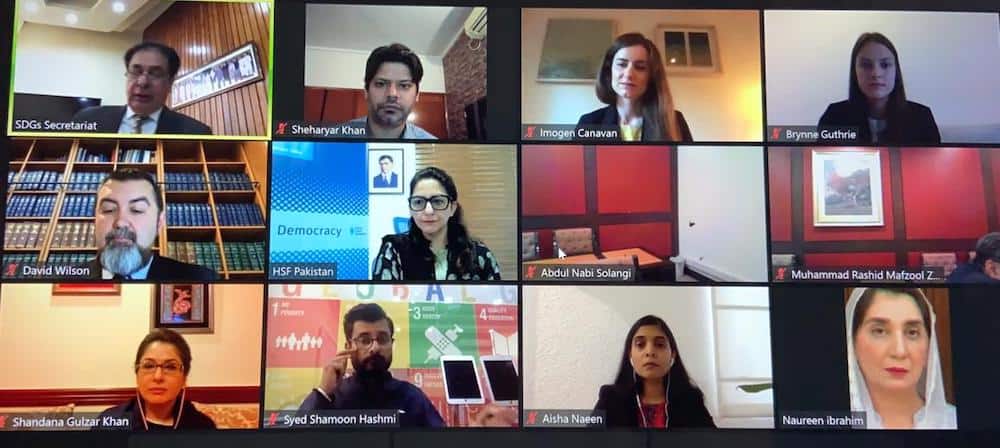The event took place in collaboration with the National Dialogue Forum and Hanns Seidel Foundation Pakistan
On 1 September 2020, the Max Planck Foundation participated in a webinar hosted in collaboration with the National Dialogue Forum and Hanns Seidel Foundation, Pakistan. This was the first webinar in a two-part series on the topic of legislative drafting in a pandemic. It focused specifically on global best practices for, and challenges faced when, creating COVID-19 related emergency legislation. Members of Parliament from the National Assembly and Senate of Pakistan, as well as legislative drafters who support the legislative work of both of these Houses, were in attendance.
The webinar was opened convened by the Honourable Riyaz Fatyana MP and chaired by Syed Shamoon Hashmi, who also made opening remarks. Sheharyar Khan from the National Dialogue Forum, the Foundation’s Country Manager, and a representative of the Hans Seidel Foundation in Islamabad made initial comments about the importance of collaboration between local and international actors and the timely nature of the discussion to be held. Following these, three expert presentations were made on the following topics. Firstly, one of the Foundation’s Research Fellows, discussed the way that the pandemic has changed the relationship between Executives and Legislatures around the world and what implications this has for the Legislature’s continued performance of oversight functions from a comparative perspective. Secondly, David Wilson, Clerk of the House of Representatives of New Zealand, discussed both the need and the dangers of expedited parliamentary procedures relied upon to pass COVID-19 related emergency legislation and the way that the New Zealand Parliament responded to these. Finally, Aisha Naeem, Head of the Attorney General’s Office of the Maldives Law Reform and Legislative Affairs Division, examined various aspects of legislative drafting with regard to emergency legislation drafted to deal with COVID-19 in the Maldives. This included examining the use of innovative drafting techniques and a discussion of methods to deal with time pressure when drafters receive policy instructions for emergency legislation.
These expert interventions were followed by a robust discussion between all of the participants. The discussions covered topics including the Pakistani approach to dealing with COVID-19, the need for technology and innovation to facilitate legislative oversight during the pandemic, and the role of opposition parties in ensuring accountable responses to the pandemic. Participants noted that some of the changes to rules and procedures made to allow the reliance on technology necessary for continued Parliamentary functioning, may be beneficial and worth preserving in the future as they increase the overall efficacy and accessibility of Parliament’s work. The discussion also underscored the initial need to empower the executive to ensure a swift response to the health crisis but explored the possibility of transforming executive orders into legislation in the medium term to ensure Parliament’s involvement in the regulation of the pandemic, particularly if it resurges for a second or third wave.
The webinar was closed by the Honourable Shaista Pervaiz MP who highlighted the importance of knowledge-sharing between representatives of different countries particularly in light of the international nature of the pandemic.
The second webinar in this series will be held in the upcoming months and will explore best practices employed and challenges faced by Parliamentarians and legislative drafters around the world in pursuing their ordinary legislative agendas during the COVID-19 pandemic. These webinars are aimed at contributing to debates around the legislative impacts of COVID-19 and are a precursor to future engagements between the Foundation, National Dialogue Forum, Hanns Seidel Foundation and Parliamentarians and legislative drafters in Pakistan.
The Foundation’s engagements in Pakistan are generously funded by the Chubb Rule of Law Fund and these webinars form part of the ongoing “Strengthening Legislative Drafting in Pakistan” project.

